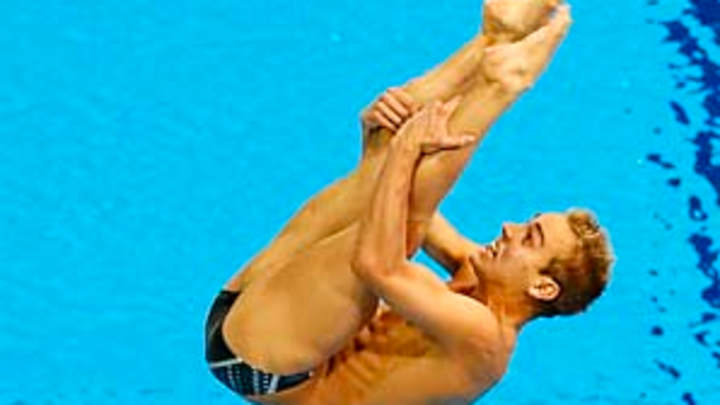Dumais, Ipsen help U.S. diving return to medal stand with bronze

LONDON -- When Troy Dumais looked out to the far scoreboard at the London Aquatics Center, he couldn't help but think of the near misses, the sixth place finishes in 2000, '04 and '08. But on Wednesday afternoon, when he finally allowed himself to look at the leaderboard, after he and synchro partner, Kristian Ipsen, finished their six dives, the 32-year-old Dumais learned he had finally become an Olympic medalist.
"There are a lot of people who wonder why athletes stay around so long," he said. "Athletes don't want to give up."
Since 2000, Dumais has been a staple of USA Diving, perennially the top prospect in a sport that the United States once dominated but has since lost ground. Coming into London, the U.S. men had earned just three medals since Greg Louganis won his second gold in 1988. And the American women, who claimed 51 medals (19 gold) from 1920 to 1976, last placed in Sydney. Neither team had ever climbed the podium in the synchronized events, which were added in 2000. The emergence of Chinese divers, who combine high difficulty dives with impeccable execution, left the U.S. stranded in its wake and a once legendary program reeling.
"At least at the last Olympics, we went into it with the added pressure of getting a medal," says Rick Schavone, USA Diving's vice chair of competitive excellence. "[We were thinking,] could we get back on the medal stand? All those kind of negative thoughts."
After the Beijing Games, however, USA Diving brought in Steve Foley, the team's high performance director and a three-time Olympian for Australia. With him, Foley brought a slightly different philosophy, one that emphasized teamwork and focused on the synchronized events.
"He was like, from Day 1, we can start this Olympics off by winning in synchro," Schavone recalls. "And [in the past] the United States did not have that attitude. So this is basically his impetus. He made us all believe that synchro was the way to go."
Mathematically, of course, it made sense. With only eight synchronized diving teams, the chances of a medal are greater than the individual event, in which about 30 divers compete for three medals. So Foley held more training camps -- opportunities for the divers, who hailed from clubs across the country, to feel like teammates and become friends. He would encourage different pairings, to be sure they had mined every last option. Even after 10-meter platform divers David Boudia and Thomas Finchum won silver at World Championships in 2009, Foley was not afraid of change; he didn't force it. Boudia went on to win Olympic bronze with partner Nick McCrory Monday afternoon, just 24 hours after the U.S. women's team of Kelci Bryant and Abby Johnston claimed silver in the 3-meter synchronized springboard final. In the four synchronized events, the U.S. earned medals in three of them, far outperforming the relatively low expectations set for 2012.
"I think a lot of people didn't expect this out of us just because of our track record at previous Olympics," Ipsen said. "But the emphasis that they put on synchro has really, really paid off."
The hope was that success would also breed more, and with Bryant and Johnston's silver on the first day, the rest of the team would be inspired. "I was so excited [for them]," Ipsen said. "The girls starting off getting a silver, I think that was so great because it just got us all super motivated. We were so excited and like, 'Yeah, let's all do this.'"
After seeing unprecedented success in the synchronized events, the U.S. will try to carry that winning momentum into the individual events, which begin with the women's 3-meter springboard preliminary round Friday and stretch until the men's 10-meter platform final on August 11.
"I think the confidence is really high on this team right now," Schavone said. "The individual is tough, probably a little tougher than the synchro, but we still have somebody in almost every event that can step up and get on the medal stand."
It will be surprising if China does not sweep the remaining gold medals (they are 4-for-4 thus far), but the U.S. can hope to gain just a little lost ground.

Writer-Reporter, Sports Illustrated Sarah Kwak joinedSports Illustrated as an editorial intern in 2006 before being hired full-time as a reporter in June 2007. A graduate of Duke University, she covered the school's storied athletics program, including three Duke-UNC meetings in Cameron Indoor Stadium and a trip to the Sweet 16. Since then, she has shifted focus from the hard-court to the ice rink, primarily covering the NHL, but she has also covered golf and two Olympics (Vancouver—2010 and London–2012) for SI and SI.com. She lives in New York, well within walking distance to at least four Chipotle locations.